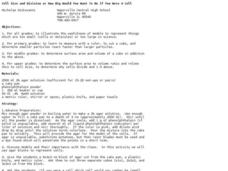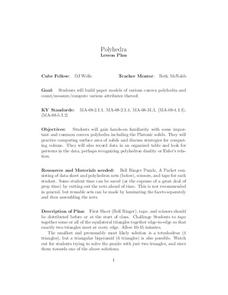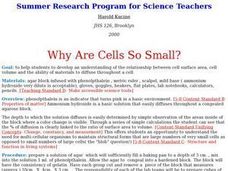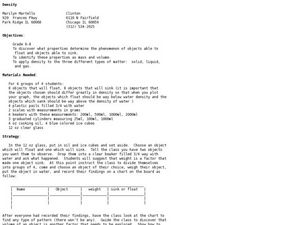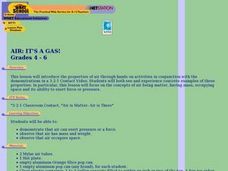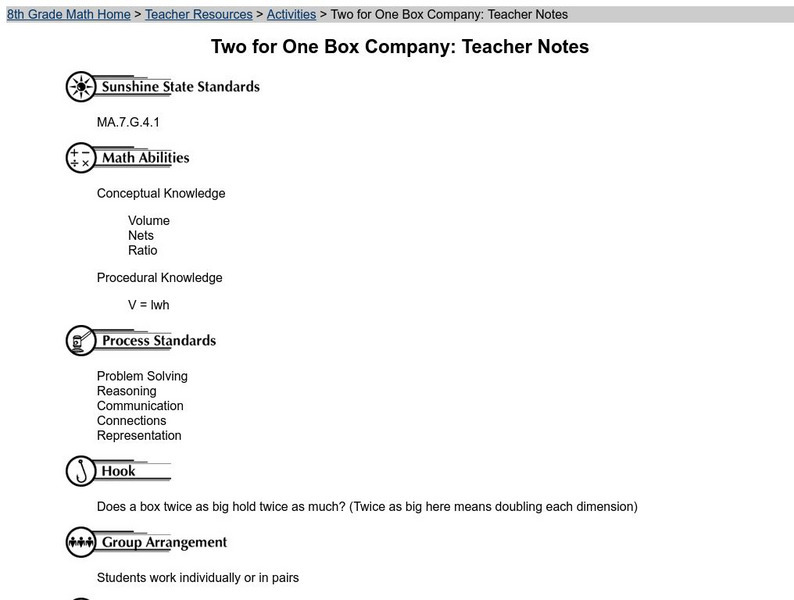Curated OER
Penny's Box
Students need to be able to calculate the volume and surface area of a cuboid as well as present a systematic list of results in order to justify the minimum case. The use of three factors of 100 is also important.
Curated OER
Exploring Projective Geometry
In this exploring projective geometry worksheet, students use computer software for instruction, then answer 9 questions about 3D drawings.
California Academy of Science
Global Climate Change and Sea Level Rise
Ice is nice, and its condition on the planet has a significant effect. Junior geoscientists experiment with ice melting in both water and on land to discover how each affect the rising sea level. This detailed lesson plan outline even...
PBS
Arguing over Area
With the help of the Area Officers and Perimeter Patrol, you learners will develop a better understanding of area and its relationship to perimeter. First, they view a video clip from Cyberchase, and then they visit a website to...
American Statistical Association
Exploring Geometric Probabilities with Buffon’s Coin Problem
Scholars create and perform experiments attempting to answer Buffon's Coin problem. They discover the relationships between geometry and probability, empirical and theoretical probabilities, and area of a circle and square.
Curated OER
Cell Size and Division or How Big Would You Want To Be if You Were a Cell?
Students investigate why cells divide. In this cell size lesson plan, students observe how far a solution travels into 3 different size model cells of agar. They answer questions about the most effect movement of "nutrients" into the...
Curated OER
Rep Tiles
Third graders use pattern blocks of one shape at a time to try to create a similar shape. They compare the perimeter of the new figure with the perimeter of the original shape and look for a pattern. Students use the pattern to predict...
Curated OER
Change It
Fourth graders expand their knowledge about how the physical properties of a substances can be changed. They are given multiple opportunities, using first-hand experiences and familiar objects in different contexts, to identify...
Curated OER
Polyhedra
Young scholars analyze convex polyhedra through hands on methods. In this geometrical shapes lesson, students construct paper models of convex polyhedra and identify the different properties including the number of sides, faces and edges.
Curated OER
Why Are Cells So Small?
Students examine the relationship between cell surface area and the ability of materials to diffuse through a cell. They participate in an experiment in which they determine which materials diffuse easier than others. They complete...
Curated OER
Commutative Property
First graders investigate the Commutative Property of Addition. It is introduced using models such as students, counters, balances and dominoes. They discover the order of the numbers in an addition sentence does not change the result...
Curated OER
Sea Ice and Sheet Ice Melting Experiment
Students observe the change in water level as a result of melting sea ice and melting sheet ice.
Curated OER
Density: Float or Sink
Students discover density. In this density lesson, students discover the properties of objects that allow them to float or sink in water.
Curated OER
Density and Buoyancy Lesson Plan
Students investigate why some objects float or sink in water. In this physics activity, students calculate the density of clay ball using a mathematical equation. They write a complete lab report about the experiment.
Curated OER
Air: It's a Gas!
Learners investigate the properties of air through hands-on activities in conjunction with the demonstrations in a 3-2-1 Contact Video.
Curated OER
How much room?
Students examine the amount of usable space that exists in their classroom using square meters and square centimeters. They apply the information to predict the ideal size of a classroom.
Curated OER
MEANINGFUL METRICS with DRAMATIC DEMONSTRATIONS
Tenth graders study the metric system. In this metric lesson students complete a lab activity and several metric worksheets.
University of South Florida
Fcat: Two for One Box Company: Teacher Notes
At this site learners use proportions to explore how volume is effected by dimension changes. This hands-on activity can be done individually or in pairs.





